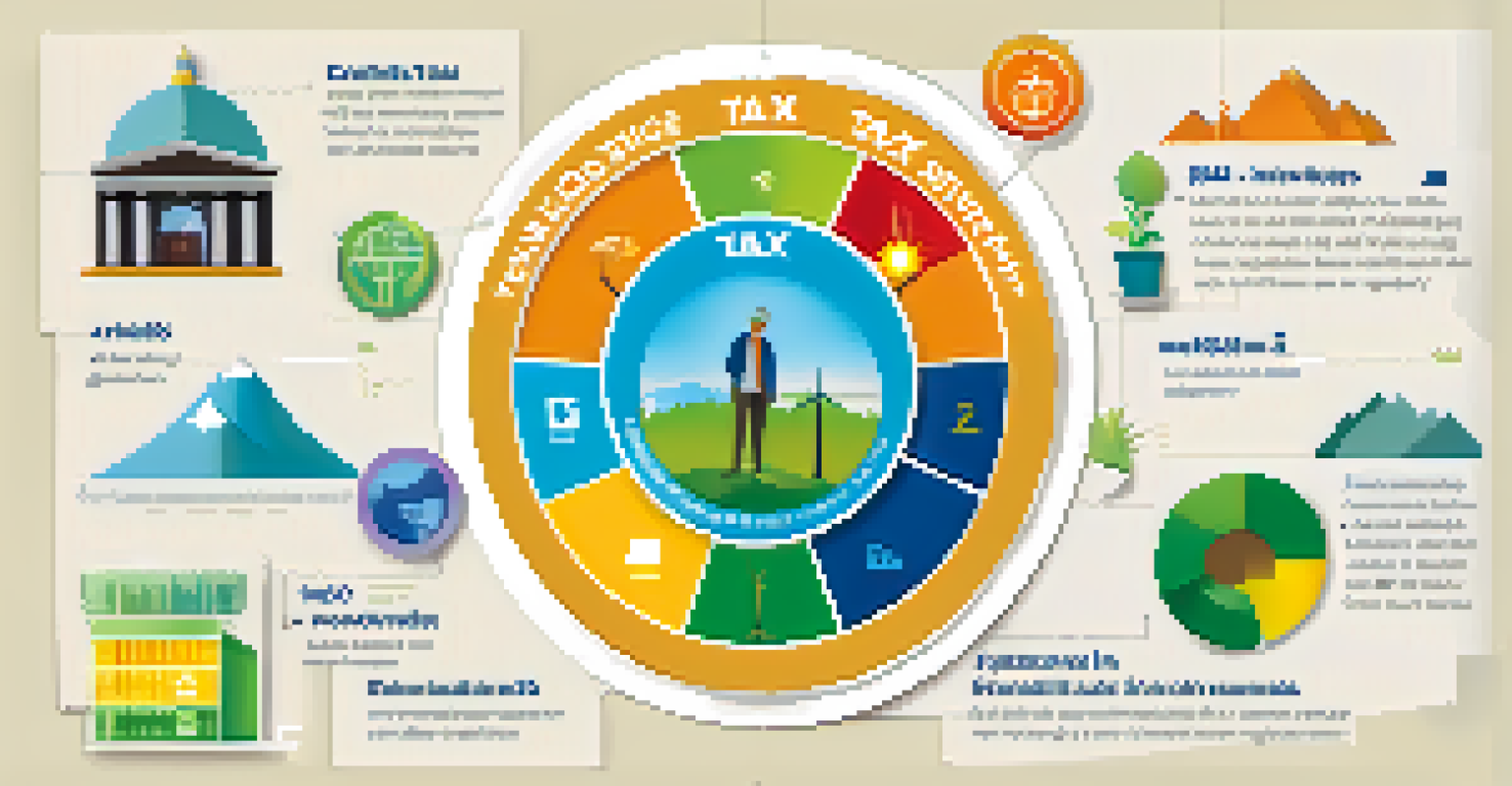Colorado's Tax Credits and Deductions: A Comprehensive Overview

Understanding Tax Credits vs. Deductions in Colorado
Tax credits and deductions may sound similar, but they serve different purposes. A tax credit directly reduces the amount of tax you owe, while a tax deduction lowers your taxable income. Think of it this way: if you imagine your tax bill as a pie, tax credits slice off a piece of that pie, while deductions make the whole pie smaller.
Taxation is just a sophisticated way of demanding money with menaces.
In Colorado, understanding this distinction is crucial to maximizing your savings. When you claim a tax credit, you could potentially wipe out your tax bill entirely. On the other hand, deductions can make a significant difference, especially for those in higher tax brackets.
As you navigate Colorado's tax landscape, keep in mind the various credits and deductions available to you. This knowledge can empower you to make informed financial decisions and ultimately save more money.
Key Tax Credits Available in Colorado
Colorado offers a variety of tax credits that can benefit residents in different ways. For example, the Colorado Child Tax Credit provides financial relief to families with children, allowing them to claim a credit based on their income and the number of dependents. This can significantly ease the burden of raising kids in today’s economy.

Another important credit is the Earned Income Tax Credit (EITC), which rewards low-to-moderate-income workers. This credit not only helps boost your tax refund but also encourages workforce participation. Many people may not realize they qualify, so it's worth checking your eligibility.
Tax Credits vs. Deductions Explained
Tax credits directly reduce what you owe, while deductions lower your taxable income, making it vital to understand both for optimal savings.
Additionally, there are credits for renewable energy investments, such as solar panel installations. By investing in green technology, you not only contribute to a sustainable future but also enjoy financial benefits through tax credits. Understanding these options can lead to substantial savings.
Deductions to Consider for Colorado Residents
In Colorado, several deductions are available that can help lower your taxable income. One of the most common is the state income tax deduction, which allows residents to deduct a portion of their income based on the state’s tax rate. This can provide a welcome relief when tax season rolls around.
The hardest thing in the world to understand is the income tax.
Homeowners should also consider the mortgage interest deduction, which enables you to deduct the interest paid on your home loan. Given that mortgage payments can be hefty, this deduction can offer significant savings and make homeownership more affordable.
Moreover, education-related deductions exist for those pursuing higher education. You can deduct tuition and fees, making it easier to manage the costs of education while investing in your future. These deductions can add up and provide a more manageable tax obligation.
How to Claim Colorado Tax Credits and Deductions
Claiming tax credits and deductions in Colorado is a straightforward process, but it requires careful attention to detail. First, you’ll need to gather all necessary documentation, such as income statements and receipts for qualifying expenses. Having organized records can streamline your filing process and ensure you don’t miss out on potential savings.
Next, familiarize yourself with the forms required for claiming these benefits. The Colorado Department of Revenue provides various forms, including the 104 Colorado Individual Income Tax Return. Make sure to fill out the relevant sections accurately to avoid delays or issues with your return.
Explore Colorado's Tax Credits
Colorado offers various tax credits like the Child Tax Credit and Earned Income Tax Credit that can significantly benefit residents.
Lastly, consider consulting a tax professional if you're unsure about the process. They can help clarify any questions and ensure you're taking advantage of all available credits and deductions. Taking the time to do this can lead to a more satisfying tax-filing experience.
The Importance of Keeping Up with Tax Law Changes
Tax laws and regulations are constantly evolving, and staying informed about these changes is essential for Colorado residents. Each year, the state may introduce new credits or modify existing ones, impacting your financial planning. For instance, adjustments to income thresholds or new eligibility requirements can directly influence your tax strategy.
By keeping an eye on updates from the Colorado Department of Revenue, you can ensure that you’re fully aware of available benefits. This proactive approach allows you to adjust your financial decisions accordingly, maximizing your potential savings each tax season.
Additionally, consider subscribing to newsletters or following reputable financial blogs that focus on Colorado tax issues. This way, you can receive timely information that helps you navigate the complexities of tax law with ease.
Frequently Overlooked Tax Credits in Colorado
Many taxpayers overlook certain tax credits that could significantly benefit their finances. For instance, the Colorado Credit for the Elderly or Disabled provides a financial break for qualifying individuals, yet it often goes unclaimed due to lack of awareness. This credit can ease the financial pressure for seniors or those with disabilities.
Another frequently missed credit is the Child Care Contribution Credit, which benefits those who pay for childcare. This credit helps alleviate the costs associated with raising children while working or pursuing education. Many parents may not realize they qualify, so it’s worth exploring this option.
Stay Informed on Tax Law Changes
Keeping up with evolving tax laws and credits in Colorado ensures you maximize your savings and make informed financial decisions.
Finally, don’t forget about the historic preservation tax credit. If you own a historic property and make qualifying renovations, you could receive a credit that reflects a percentage of your expenses. This is not only beneficial for your wallet but also contributes to preserving Colorado's rich history.
Planning Ahead: Tax Strategies for Colorado Residents
Effective tax planning can significantly impact your financial well-being in Colorado. Start by evaluating your financial goals and how tax credits and deductions can align with them. For instance, if you plan to purchase a home, consider how the mortgage interest deduction could play a role in your budget.
Additionally, think about your investment strategies. By investing in renewable energy or education, you not only contribute to long-term goals but can also take advantage of related tax credits. Integrating these strategies into your financial plan can lead to enhanced savings and less stress come tax time.

Lastly, remember that tax planning isn’t just a one-time task. Regularly review your financial situation and adjust your strategies as needed. By staying proactive, you can navigate the tax landscape with confidence and maximize your benefits in Colorado.